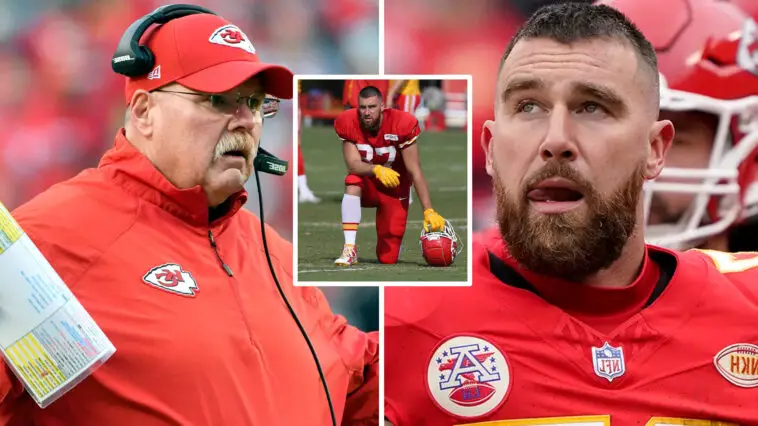

In a move that reverberated through the sports world and beyond, Kansas City Chiefs’ Head Coach Andy Reid made headlines last week when he dismissed three of his top players from the team for kneeling during the national anthem. This decision, encapsulated in Reid’s stern declaration “Not on my field,” has ignited a firestorm of debate, drawing attention to the ongoing struggle between sports, politics, and personal beliefs.
Andy Reid, known for his no-nonsense approach to coaching and deep respect for the game of football, took a stand that many view as a testament to his unwavering principles. The three players, whose actions were intended as a peaceful protest against social injustices, found themselves at the center of a controversy that questions the balance between freedom of expression and respect for national symbols.
The incident unfolded on a crisp Sunday afternoon, moments before the Chiefs were set to face their rivals. As the first notes of the national anthem filled the air, the three players took a knee, their heads bowed in a gesture that has become synonymous with the protest against racial inequality and police brutality. The stadium, packed with fans awaiting the kickoff, fell into a hushed silence, the players’ protest casting a shadow over the game.
As the dust settles, the incident serves as a poignant reminder of the complex relationship between sports, politics, and society. Coach Reid’s decision, whether viewed as a stand for patriotic values or a silencing of dissent, highlights the ongoing struggle to navigate these turbulent waters. The debate over the right to protest, the meaning of patriotism, and the role of sports figures as social activists continues to unfold, challenging individuals to consider their own values and beliefs in the face of an ever-evolving societal landscape.
In conclusion, “Not on my field” is not just a statement made by a football coach; it’s a catalyst for a broader discussion about freedom, responsibility, and the power of sports as a platform for social change. As America grapples with these issues, the actions of Coach Reid and his players serve as a reminder of the enduring importance of dialogue, understanding, and respect for diverse perspectives in the pursuit of a more equitable and just society.